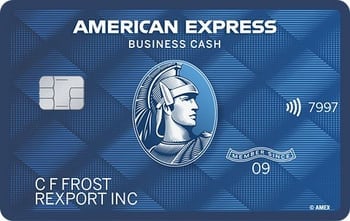How to Get and Build Business Credit
First, register your business so credit bureaus know about it. Then, open a business credit card and establish tradelines.
Many, or all, of the products featured on this page are from our advertising partners who compensate us when you take certain actions on our website or click to take an action on their website. However, this does not influence our evaluations. Our opinions are our own. Here is a list of our partners and here's how we make money.
Business credit measures how good your business is at paying suppliers and lenders on time.
Building business credit is a two-step process:
- Become visible to business credit bureaus. You can do this by registering your business and applying for an EIN and DUNS number.
- Start borrowing money and paying it back. You can do this by opening a business credit card or trade line that reports to business credit bureaus.
You can build business credit in a matter of months. But you need to be intentional about it. Make sure you have at least one trade line or business credit card and always pay it on time.
Here’s a step-by-step guide to establishing business credit and building a strong profile over time.
1. Formalize your business finances
The first step toward establishing business credit is setting up your business finances.
Start by applying for an EIN, or employer identification number, from the IRS. This is an identification number for your business and you’ll use it to file taxes.
Sole proprietors can use their Social Security number instead of an EIN to file taxes. But applying for an EIN helps make it clear that your business is its own entity.
After that, open a business bank account and use it for all your business income and expenses. This isn’t formally part of building business credit, but it’s an important part of managing your business finances.
2. Apply for a DUNS number
A DUNS number also identifies your business. This nine-digit number is issued by Dun & Bradstreet, one of the most widely used business credit bureaus.
Other businesses and potential creditors can look you up via your DUNS number. They may do this to check your company’s credit report before agreeing to do business with you.
You might already have a DUNS number if another business has reported your activity to D&B. You can check on D&B’s website. If you don’t have one yet, it’s free to apply.
» MORE: How to get a DUNS number
3. Learn about the business credit bureaus
In general, most credit-building tactics will help your business across the board. But the business credit landscape is pretty fragmented. You can have more than a dozen scores across multiple credit bureaus. You should know where to look to achieve your goals.
For instance, say you want an SBA 7(a) loan. Approval will depend on your FICO SBSS score. So, understand what affects it. (That’s a mix of data from other business credit bureaus, your loan application and your personal credit.)
Simply wondering what potential creditors might see about your business? That’s trickier.
There are three major business credit bureaus: D&B, Experian and Equifax. A lender or potential business partner could look at any or all of them. Your best bet is to keep an eye on each to make sure all your scores are moving in the right direction.
4. Open a business credit card
Most small-business cards report activity to at least some business credit bureaus. American Express told NerdWallet that it reports to D&B, Equifax and Experian, for example. U.S. Bank reports to D&B.
On-time payments will help build your business credit. So will watching how much available credit you use. Less is more when it comes to credit utilization. Keeping your balance below 30% of your total credit limit can be a good target, though it’s not a hard-and-fast rule.
On the other hand, missed payments and delinquencies can hurt your business credit. Card issuers may also report missed payments to consumer credit bureaus, which affects your personal score too.
If you have good or excellent personal credit (a FICO score of 670 or above), you’ll have lots of business credit card options. If not, focus on the trade lines and credit-builder services in the next steps.
Compare NerdWallet's top-ranked business credit cards when you're ready to choose one.
5. Establish trade lines
Suppliers often extend trade lines or net-30 accounts to businesses they work with. That means they send you an invoice that you can pay several days or weeks after you receive your order.
If the supplier reports these payments to the business credit bureaus, then that can help build your credit the same way a credit card does.
If your supplier doesn’t report payments to Dun & Bradstreet, you can manually submit them. You need to pay D&B to do this. Their team will collect your trade data. But this doesn’t guarantee inclusion. For instance, the supplier may not respond or D&B may not find it trustworthy.
You can ask to set up trade credit with any small vendor, such as your water or office supplies distributor. Try to set up several. You’ll need at least three trade references for Dun & Bradstreet to generate a PAYDEX score.
Have more? Dun & Bradstreet says its scoring model can consider up to 875 different vendors when calculating your business credit score. It can list 80 accounts on your credit report, too.
6. Consider a business credit building service
If you don’t have any suppliers that report to business credit bureaus, consider a business credit builder service instead. These companies issue you a monthly bill. When you pay it on time, they report it to business credit bureaus as a trade line. They may also report other recurring payments, like utility bills. In general, these services cost $20 to $50 per month.
Some, like Nav Prime, offer business and personal trade lines. That means you can work on both types of credit at the same time.
If you go this route, proceed with some caution. There aren’t many regulations on credit-building services, so check online reviews to see if other business owners feel like they got their money’s worth. And make sure you understand what you’re agreeing to — especially whether your credit will take a hit when you stop paying for the service.
7. Pay creditors on time — or early
Payment history is the most important factor in determining your business credit score. Making debt repayments on time and in full will help you build a stronger business credit profile over time.
While on-time payments are good, early payment is even better. Dun & Bradstreet assigns its highest PAYDEX scores to companies that pay early.
Choose your small-business financing wisely and avoid overextending yourself with regard to debt. NerdWallet's list of the best small-business loans can help you compare lending options before you borrow.
8. Avoid (or adapt to) judgments and liens
Judgments, liens and bankruptcy filings have a negative impact on your business credit score.
Unpaid taxes or business debt can result in a lien, granting creditors a legal right to seize your property to satisfy the debt. And unpaid debt may eventually result in a court ruling — also called a judgment — against your business.
These negative marks on your business credit report can stick with you. Experian, for instance, keeps bankruptcies on business credit reports for nine years and nine months. Tax liens, judgments and collections can remain for almost seven years.
Does your credit report still show a lien for a loan you’ve paid off? Contact the lender and ask them to file the documents needed to forgive the lien.
9. Monitor your business credit reports
Check your business credit scores to ensure all trade lines are accounted for. Keep in mind that not all lenders report to business credit bureaus. Merchant cash advances typically don't, for instance.
If you spot any errors on your report, such as incorrect negative marks or misspelled addresses, report them to the respective business credit bureau.
You can’t freeze your business credit. So it’s important to monitor it for signs of identity theft, like tradelines or inquiries you don’t recognize.
Try to check your D&B business credit credit monthly. The free report includes what ranges your credit scores are in, a summary of legal events and a tally of recent credit inquiries. That should alert you to any potential fraud. One-off credit reports from Experian and Equifax cost around $50.
Your bank might have some credit monitoring tools. For example, Bank of America business customers can see two D&B credit scores for free. Lili users get an introductory price ($18 per month) for credit building and monitoring.
If you want to keep a closer eye on things, you can pay for business credit monitoring services through companies like Experian and Nav. In general, these services cost several hundred dollars per year. If you regularly make deals with new suppliers or business partners, actively monitoring your credit may be worth it.
10. Build your personal credit, too
Your personal credit generally doesn’t impact your business credit. But it can still affect your ability to get business financing.
That includes:
- Issuers mostly base business credit card approvals on your personal credit score.
- Your personal credit score affects your FICO SBSS score, which is a factor in getting an SBA 7(a) small loan ($500,000 or less).
- Most business loan applicants use a combination of their personal and business credit.
If your personal credit score is in the bad or fair range (FICO scores of 669 or below), make a plan for building your credit. You can work on both personal and business credit at the same time.
Building your personal credit is similar to building your business credit. You need to borrow money and pay it back on time. In general, the more consistent you are paying lenders, the stronger your credit history will be.
Frequently Asked Questions
What is business credit?
Business credit is a history of your company’s debt repayments. A strong business credit history and business credit score show other entities that you’re a reliable borrower. That can help you qualify for better business loan interest rates and terms, lower business insurance premiums and more.
How do you build business credit fast?
Registering your business and applying for a business credit card can help you start building business credit right away. As your business grows, establish trade lines with your suppliers and make sure to borrow from lenders that report payments to business credit bureaus.
Article sources
NerdWallet writers are subject matter authorities who use primary,
trustworthy sources to inform their work, including peer-reviewed
studies, government websites, academic research and interviews with
industry experts. All content is fact-checked for accuracy, timeliness
and relevance. You can learn more about NerdWallet's high
standards for journalism by reading our
editorial guidelines.
- 1. How to Get a D-U-N-S Number. Dun & Bradstreet. Accessed Sep 2, 2025.
- 2. Dun & Bradstreet. Changes to a Business’s PAYDEX Score. Accessed Aug 26, 2025.
- 3. Experian. Understanding business credit. Accessed Aug 26, 2025.
- 4. Fed Small Business. 2020 Report on Employer Firms: Based on the 2019 Small Business Credit Survey. Accessed Aug 26, 2025.
On this page
- 1. Formalize your business finances
- 2. Apply for a DUNS number
- 3. Learn about the business credit bureaus
- 4. Open a business credit card
- 5. Establish trade lines
- 6. Consider a business credit building service
- 7. Pay creditors on time — or early
- 8. Avoid (or adapt to) judgments and liens
- 9. Monitor your business credit reports
- 10. Build your personal credit, too
Related articles








